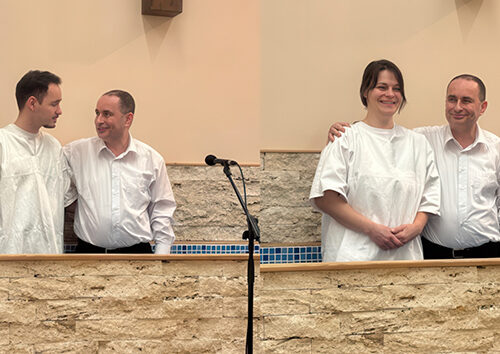09 January 2025 St Albans, UK [Pilira Zapita and Adventist Review]
I was once asked during an interview, “If you had to choose one theme to preach on, what would it be?” I instantly replied, while my eyes welled, “God’s grace. No competition. Grace.”
Years before this interview, grace may not have featured as promptly as an answer. God took me through a paradigm shift to get me to where grace takes prominence in my life.
My Journey
I’m Pilira, and I’m a recovering legalist. When God started me on this journey, Paul’s epistle to the Romans had already changed my life. This shift happened quite unexpectedly.
I am a third-generation Adventist who grew up on The Bible Story and Uncle Arthur’s Bedtime Stories. My maternal granddad was an Adventist pastor, and my dad was raised by his uncle, also an Adventist pastor. My parents were committed Christians and church leaders who loved Jesus and people. The central artwork in our lounge was a portrait of Christ with a crown of thorns, which, despite its sad expression, kept alive the truth of Christ’s love and sacrificial death. In our dining room was a plaque reminding us, at every mealtime, that “Christ is the head of this house, the unseen guest at every meal; the silent listener to every conversation.” Because I have always loved words, I never tired of reading them, and naturally, their impact on my life was not lost. Unfortunately, I did not quite see it as Christ the loving companion and friend, but more like “Be careful what you say! He’s listening!” All in all, since childhood, my young heart has been drawn to God. I loved Jesus so much and wanted to please Him.
I garnered a lot of scriptural knowledge over the years. Still, without realising it, I was, nevertheless, drawn into the world of legalism, with its exclusivist, critical, judgmental, and holier-than-thou attitude. Not that I was a horrible person. I just often thought How God must love me because I’m such a good Adventist young woman!
Slowly, God started challenging my self-righteousness and condemnation of others I thought were not good enough because they did not match me in every belief and practice. These piece-by-piece stirrings of grace climaxed when an Adventist pastor and scholar from the University of Eastern Africa, Baraton, in Kenya, came to our church for a weeklong series on the book of Romans. He challenged us from the start “If you understand this message I’m sharing with you, your lives will never be the same again!” Now a grown woman, I responded with the cynicism I had developed over the years, even saying to my husband, “It’s the same old same old. What will he tell us that we don’t already know?” I had no idea God was just about to shake the foundation of my theology!
By the time that week finished, a new season had launched in my life—an era of progressively unpeeling this incredible reality called grace! For a few months afterwards, I cried so much as I asked God, “How did I miss this?” I would later realise that some church literature and the lens of interpretation I had used, however well-meaning, obscured the fact that the biblical story screams, “God is gracious and passionately in love with you!” Instead, the interpretation lens I used screamed, “Keep God’s laws, and He will love you. If you are not good enough to earn His favour, He will reject you!” I somehow missed seeing the law as a fruit of a relationship with God and evidence of the Holy Spirit’s presence and power, not a way to earn His approval.

This experience opened my eyes to many new realities, but I can share only a few.
First, I am loved, accepted, and secure, and I have the assurance of salvation in Christ. While I somehow caught and lived the lie that God loved me because of what I did, it was so life-changing to know that in Christ, God’s grace embraces me! What a massive relief it was that I could not earn my way to God, and I happily exchanged performance with grace. It started the lifelong process of true discipleship: learning, unlearning, and relearning, with the joy of watching God unpeel numerous lies I had come to believe about Him, myself, other people, the church, and the world over the years!
Next, I was drawn into the heart of Christ’s farewell discourses in John 13-17. The change from work-centred to relationship-centred spirituality birthed in me a hunger for that union of abiding in Christ. It was not long before I realised the reality of Christ’s words “Apart from Me you can do nothing” (John 15:5, NASB).1 As God’s Spirit brought me face-to-face with my vulnerable inner life, I discovered that my only hope was to lean on Christ’s total sufficiency. Legalism had inadvertently taught me condemnation of myself and others, guilt, shame, and the underlying sense that I just was not and would never be good enough. Jesus started replacing that with forgiveness, hope, acceptance, honour, security, and dignity, recognizing that as long as I come to Christ in faith, I can be assured that He will forgive and cleanse me (1 John 1:9) and complete the good work He has started in me (Phil. 1:6).
An Unexpected Consequence
The paradigm shift that replaced an imperceptible legalistic religion with a relationship-centred spirituality had consequences I did not expect beyond those that impacted me personally. One was the deep compassion that God’s Spirit evoked in me toward the “erring.” Something shifted in me as I now saw myself as belonging in the same position as all “sinners” (see Rom. 3:23, 24), especially those some cast stones at through words, silence, actions, and nonactions. I had been blind to the extent of my self-righteousness and exclusivity. God started lending me His lens when looking at people, especially those experiencing complex issues because we live in a fallen and broken world. I started relating differently to those I had been taught, however inadvertently, to shun, avoid, and label. Some people thought that I was too tolerant or condoned sin, and some still think it today. What they do not understand is that my heart was led to look beyond people’s faults and see their priceless worth that is obscured by all life’s brokenness. Our need for God’s abundant grace is equal, and we can share this revolutionary gift as freely as God gives and we receive it.
What Is Grace?
Some words and concepts associated with the Hebrew noun khen, and the Greek word charis, both often translated as grace, are favour, attractiveness, rejoicing, kindness, delightful, “God freely extending Himself . . . reaching (inclining) to people because He is disposed to bless (be near) them.”2 About Jesus, John writes, “For out of His fullness (abundance) we have all received [all had a share and we were all supplied with] one grace after another and spiritual blessing upon spiritual blessing and even favour upon favour and gift [heaped] upon gift” (John 1:16, AMPC).3 This is God’s unlimited, expansive, free, and wholesome generosity poured out on the world.
The Scandal of Grace and the Problem of “Ungrace”
In a world full of “ungrace,” as Philip Yancey calls it,4 the idea of receiving something without merit sounds inconceivable, absurd, and unpalatable. The culture of the world, driven by a broad spectrum of ideologies and religions that demand work to earn something, finds the concept and reality of a gift that costs everything to the giver and is given freely to the recipient – laughable and impossible! Performance-drivenness seems inherent in many cultures and religions and is often internalized through systemic processes that celebrate and reward those who work hard and somehow punish those who seemingly do not. I am not aiming to critique this way of thinking and doing by saying this, but to emphasize how it is so inherent in life that accepting God’s free gift of grace becomes very difficult. Yet Scripture clearly teaches, “For by grace you have been saved through faith, and this is not of yourselves, it is the gift of God; not as a result of works, so that no one may boast” (Eph. 2:8, 9, NASB).
Examples of “ungrace” among us are numerous, from the personal to the systemic. Some have argued that “ungrace” is even more prevalent among those who claim to follow Christ, for, as history has shown when one believes God has endorsed or mandated something, one might also mistakenly think that hate-fueled division and passion that even kills, both metaphorically and literally, is justified. Yet many theologians have argued that grace is Christianity’s best gift to the world. How do we reconcile this?
However “ungrace” manifests in all of us, it reveals our shared need for grace. The Bible claims that no one is righteous (Rom. 3:10) and that our hearts can deceive us about our true condition (Jer. 17:9). These and many other biblical texts emphasize that the problem with our fallen nature needs more than behaviour modification. Only Christ’s redemptive grace and righteousness are sufficient to atone for the internal and external battles we face daily—against spiritual pride, judgmentalism, anger, unforgiveness, and the underlying feeling that we must somehow earn God’s approval.

Let’s briefly try to answer this question through the lens of how Jesus lived on earth, God in human flesh, who was saturated with the presence and power of God’s Spirit.
Scholars seem to agree that the four Gospels target different faith communities and contain different emphases. I propose, however, that they all emphasize and agree on how Jesus loved. His love was radical, inclusive, and outside-the-box, pulling the outcasts, marginalised, and ostracised into His circle (see Matt. 9:10-13; Mark 2:15-17; Luke 7:36-50; John 4:4-42): they felt comfortable around Him! While some scholars note that He did not target “politics” in the contemporary sense of the word, Christ’s revolutionary life was very political. See how He got in trouble with the religious and political systemic powers of His day; it ultimately cost Him His life. This countercultural Christ revealed in the Gospels was the personification of God’s abundant grace, and altogether, the Gospels portray Jesus having His harshest rebukes, not on the erring, strugglers, and outsiders, but on those who had been made custodians of God’s grace but had utterly misrepresented Him. Instead of prioritising relationships over rulebooks, mercy over moral demands, and a loving community over a judgmental and exclusive one, they distorted the picture of God. Jesus brought the healing view of God we all need to know and experience: God is abundantly gracious and inclusive!
How Then Can We Not Show Grace?
I started this article by sharing my journey to grace-consciousness. It transformed my life, gave me dignity, removed an underlying sense of shame, and affirmed me to live life from the place of God’s steadfast love. Over the years, though, as I deepen my knowledge, understanding, and experience of God’s grace, I realise how much grace will always matter to me. I note how impatient I can become with people who are where I used to be—legalistic, exclusive, judgmental, and critical toward those most in need of God’s transforming grace. While my heart has increasingly bled with the horrible suffering, injustice, systemic oppression, pain, despair, poverty, sin, and evil in its numerous manifestations, I have realised my need for grace so that I can also be inclined toward those who are still on the journey of unlearning, learning, and relearning; those I believe should know better. As we are all on a journey, we are challenged to receive and give grace continually.
Currently, I am living out God’s call on my life to speak out against systemic oppression and social injustices, specifically through the lens of God’s Spirit of wholistic life. Yet this same Spirit who ignites my passion to challenge ourselves as accountable to God on how we treat each other also calls me to embody grace toward those whose opinions I passionately disagree with. Grace does not mean critiques should not be given or left unsaid; otherwise, the strong biblical prophetic voices would not exist, nor would Jesus’ prophetic voice toward the religious leaders of His time. While fervently offering a corrective, grace also fosters inclusive, all-embracing love, quite revolutionary in a world increasingly polarised by power and systems that perpetuate hate against the “other.” If we remember that none of us will ever equal Christ’s perfection on this side of eternity, we will uphold and cling to God’s grace, Christ’s all-sufficiency, and the indwelling Spirit. Then, when we fail, forgiveness and restoration are never obscured because we know that our performance will never earn us God’s love. God remains abundantly loving, gracious, generous, faithful, and willing to forgive all who repent and accept His love. That grace-infused perspective, rather than a legalistic one that seeks the impossible goal of earning grace, is what I choose to embody for the rest of my life!
The original version of this article first appeared in Adventist Review online.
1 Scripture quotations marked NASB are from the New American Standard Bible, copyright © 1960, 1971, 1977, 1995, 2020 by The Lockman Foundation. All rights reserved.
2 HELPS Word Studies, https://biblehub.com/greek/5485.htm.
3 Scripture quotations credited to AMPC are taken from Amplified Bible, Classic Edition, copyright © 1954, 1958, 1962, 1964, 1965, 1987 by The Lockman Foundation. All rights reserved. Used by permission.
4 Philip Yancey, What’s So Amazing About Grace? revised and updated(Grand Rapids: Zondervan, 2023).
Pilira Zapita is a visiting lecturer in Apologetics, Contemporary Evangelism and Discipleship at Newbold College of Higher Education.
[Featured image: Alex Harvey-Brown].



